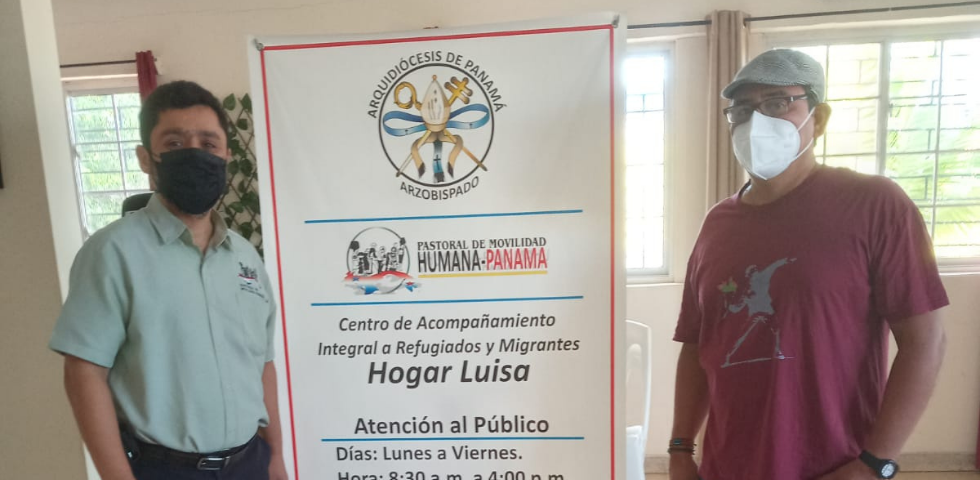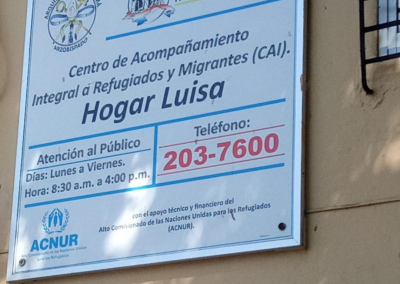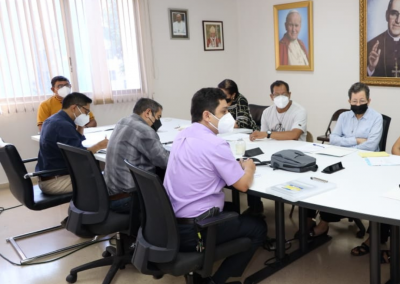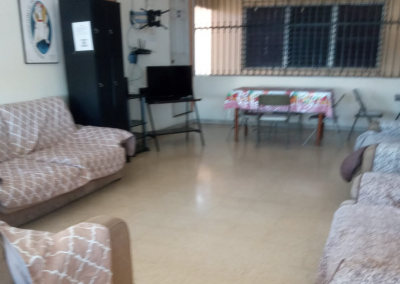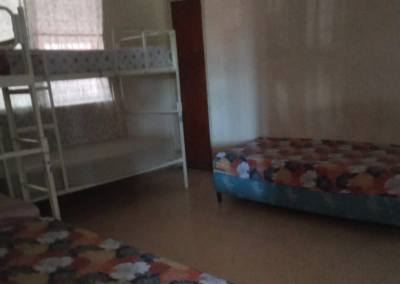I want to share the journey we have taken of late, with the intention of involving ourselves as Franciscans in accompanying migrants, and setting up the RFM team in Panama.
On March 8, Fr. Jose Olmos, OFM and I visited “Hogar Luisa” Center for Comprehensive Accompaniment (CAI) for Refugees and Migrants, in Panama City, the capitol of Panama. In this refuge we were attended by the director and administrator, Jorge Luis Ayala, who is also the national representative of the “Pastoral de Movilidad Humana–Panama” (Human Mobility Ministry–Panama). This center operates under the auspices of the Archdiocese of Panama, with its main funding coming from UNHCR and other local contributions.
The house has capacity for 35 migrants, in terms of beds and rooms, with separate rooms for men and women. When a member of the LGTBI community arrives, by mutual agreement they agree to be in the common room of their choice; that is, they do not have a designated space for the LGTBI community. During the pandemic, they were filled to capacity. This home is sought out by migrants of different nationalities, and they are referred by state institutions and civil society. The CAI has been operating since 2012 in the capital.
Human mobility as a ministry began in 2011 in the Darien Gap, when the numbers of people fleeing the conflict in Colombia began to grow. Also, Cubans and other transcontinental migrants began to arrive through this jungle route as well. Since 2013, the human mobility ministry has been operating in Panama City, with the Hogar Luisa as its headquarters (Hogar Luisa previously worked for sexually abused minors).
Today, the “Darién route,” as it is known, runs through the jungle and a stretch of the sea. Migrants are transferred by the state from Darién to Chiriquí, in Gualaca. The idea is that migrants pass through Panama, but don’t stay in the country. You should know that the refugee applicant process in Panama can take up to six years. Before the pandemic, there were about 2,000 migrants waiting for refugee status.
On the day of the visit to “Hogar Luisa” CAI there were about six migrants, but I only saw two of them. The procedure in the CAI is that each migrant undergoes an interview with the social worker to see if they meet the profile. This refuge does not receive unaccompanied minors, the elderly, or pregnant women, since as it does not offer the right conditions for their accompaniment.
A relevant fact is that the Human Mobility Ministry is a national entity; however, it is run by the Archdiocese of Panama City, which means that there is no coverage or direct support from the other dioceses in the country.
On March 9 at the headquarters of the archdiocese, we participated with Fr. José in a meeting of the Human Mobility Table of the Catholic Church in Panama. The participating institutions were: Archbishop Mons. Ulloa, Jesuit migrant network, human mobility, Caritas, Sisters of Mercy, the archdiocese, and Franciscans. Each organization presented what they are doing regarding the accompaniment of migrants, and information was exchanged. Then he went on to talk specifically about a training project on “soft skills,” which is aimed at migrants residing in Panama City; These courses will be taught via Zoom and in person. This is a project that has a focus on entrepreneurship and labor integration, especially for migrant women, who are the majority in the country.
In terms of resources for accompaniment of migrants, the archdiocese has three spaces: the “Fe y Alegría” shelters, Hogar Luisa, and training centers for the Sisters of Mercy.
This Table is being constituted again, for this reason, the main agreements were:
- How we influence in relation to the policies directed to the migratory treatment of migrants.
- It is necessary to create the CLAMOR Panama chapter.
- Protocols must be made for shelters for minors, the elderly, the homeless, and other vulnerable groups.
- “Soft skills” courses will be held, this is coordinated by the Jesuits.
- A press conference is suggested to introduce the MH table.
- Reach parishes, developing a process of pastoral accompaniment, human rights and national integration with respect to migration.
- A meeting with the government entities that assist migrants is urgently needed to expose the situation from our ecclesial perspective and carry out joint work.
As Franciscans, these spaces in which we can participate in migrant accompaniment always lead us to concretize our mission as the FNM. The reality of migration in the territory of Panama occurs in three types: internal migration for work (especially of indigenous people), foreign migration that is in transit, and those who seek Panama as a destination.

